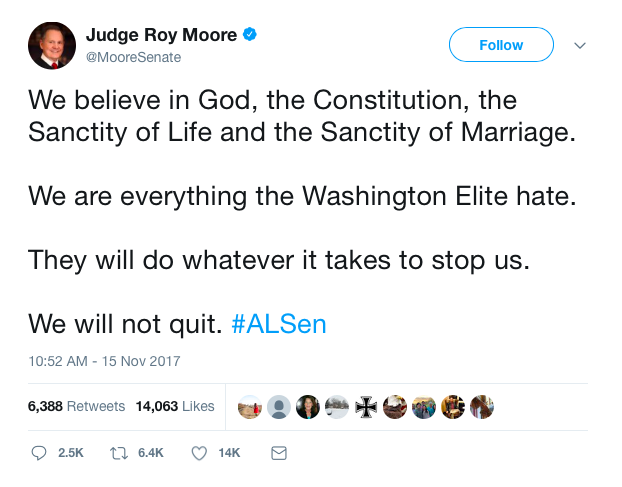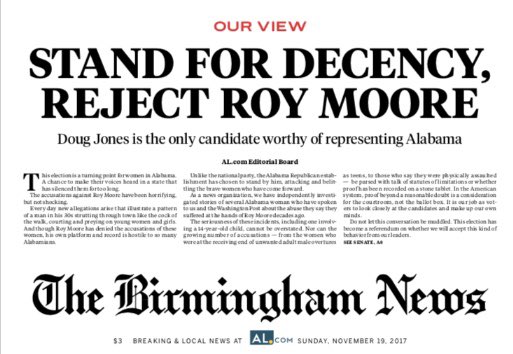As allegations of inappropriate behavior against politicians continue to swirl, the soap opera that is the upcoming Senate election in Alabama is becoming a test of what voters are prepared to tolerate, or even endorse.
Home of the Crimson Tide, Alabama is as red a state as they come; and its almost Hiaasen-esque cast of characters are helping tell one of the more fascinating tales of local politics in modern America. Before we get to where things currently stand, and the outlook for the remaining three weeks until polling day, it’s worth rewinding through some previous episodes to see how we got here and what’s at stake.
In last year’s presidential election, Donald Trump won Alabama by 28 points. Its most recent Democrat Senator was Howell Heflin; who retired in 1996 to be succeeded by Jeff Sessions. Ten years earlier, Heflin had famously voted against Sessions’ appointment to a federal judgeship by Ronald Reagan. This year, Sessions’ appointment by Donald Trump as US Attorney General brought the political wheel around again and set the process in motion for the special election now scheduled for December 12.
After Sessions’ confirmation in February, former Alabama Governor Robert Bentley appointed the state’s Attorney General Luther Strange as Sessions’ temporary replacement until the next scheduled election cycle in 2018, saying that holding a special election before then would be unnecessarily expensive. The fact that Bentley was at the time being investigated over allegations of an affair with an aide raised some eyebrows over his choice of Strange, the state’s top law enforcement official.
Bentley – who had become known as the “Love Gov” – resigned in April on the brink of impeachment and was replaced by Lt Gov Kay Ivey. Ivey then moved the special election to fill Sessions’ seat to December this year, saying she had “promised to steady our ship of state,” and that “people should vote for a replacement US Senator as soon as possible.”
Following the parties’ primaries in August, Democrat Doug Jones, a former US Attorney, easily came out on top of his race, but none of the ten GOP candidates secured a majority, leading to a run-off between the top two – current temporary incumbent Luther Strange, and Roy Moore, a judge and hero of the alt-right, who had twice been removed as the state’s chief justice.
President Trump and Senate leader Mitch McConnell backed Strange, while former White House adviser Steve Bannon threw his – and Breitbart’s – considerable weight behind Moore. Conservative Washington Post columnist Jennifer Rubin wrote that victory for Moore would be “a sign that Trump has unleashed extreme, unhinged populist sentiments that not even he can contain.”
Despite being outspent 10-1, Moore defeated Strange 55-45, setting up the December contest against Jones.
Bombshells
And then the race changed completely. A series of allegations emerged against Moore, beginning with a Washington Post report that he had “initiated (a) sexual encounter” with an underage girl. Moore denied the claims, calling them a “desperate attempt to stop his political campaign.” Even as more allegations surfaced and Republicans in Washington looked for distance, Moore’s supporters rallied round as his campaign was painted as an act of defiance against national liberal elites.
The subsequent emergence of allegations of inappropriate behaviour against a darling of the left and powerful liberal voice, Sen Al Franken, came as a godsend (no pun intended) for Moore’s supporters.

In Franken’s case, despite an apology and the Senator calling for an ethics investigation into himself, he may find that a picture really is worth a thousand words. And of course President Trump – who had been silent on the Moore allegations – couldn’t resist diving in once Franken was the subject. But the President needs to be careful about re-opening the debate about the allegations against himself.
Masha Gessen, writing in the New Yorker, looks at both sides of the “should Franken resign” question and wonders, in fact, if that’s the wrong question. She writes:
…There is something particularly disquieting about the similarity of [Franken’s] alleged actions, as described by Leeann Tweeden and acknowledged by him, to the behavior Donald Trump described in the “Access Hollywood” recording. But the more disturbing charges against Trump concerned women whose careers he controlled, such as the former Miss Utah Temple Taggart and the “Apprentice” contestant Summer Zervos. Those cases illustrate the real issue here: the power imbalance that allows some men to take women hostage using sex.

As for Moore, the allegations against him have illustrated the deep division between and among
many modern Republican voters – both locally and nationally. The Washington Post drew a line back to a tradition of defiance “long before the state’s segregationist Governor George Wallace” as a way of explaining why many local Republicans have closed ranks around Moore.
Christian voters in particular, a year into Donald Trump’s presidency, are facing what the Washington Post calls a “spiritual reckoning.” Episodes like the Moore situation haven’t made life any easier for them. Meanwhile, the more establishment Republicans urged Moore to step aside, the more determined his supporters appeared to become.
While the Governor has said she will vote for him, the state’s influential newspapers have come out against Moore. The Birmingham News, in a strongly-worded editorial, said:
Do not let this conversation be muddled. This election has become a referendum on whether we will accept this kind of behavior from our leaders.
Alabamians have never cared about what the rest of country thinks of them. And we do not expect all the handwringing from national pundits, conservative or liberal, to make much of a difference. This election isn’t about what a late-night comedian may think of Alabama or whether Sean Hannity can sell advertisements; it’s not about Saturday Night Live or Mitch McConnell. It’s not about Breitbart or National Democrats. It is about the moral values of the people of Alabama.
Do not make your voting decision based on who it will affect on a national stage. Vote based on who it will affect in your hometown.
In another sign of the unpredictability surrounding politics in the state right now, a poll last week showed President Obama as having a slightly higher favorable rating than the current incumbent of the White House.
The most recent head-to-head polls have showed the Senate race close or Jones with a lead; but one poll also indicated that 29% of Alabamans said they were more likely to vote for Moore because of the allegations. Generally, while women appear to be gravitating towards Jones, as FiveThirtyEight reports, in a state where 35 per cent of the population identifies as white evangelical Protestant, that base will be crucial to whether Moore can get across the line. In a race like this, three weeks is a lifetime in polling terms.
So as the election approaches, we have senior Congressional Republicans distancing themselves from Moore, while the White House and its advisers – and former advisers – are now seemingly reconciled to toughing it out to get Moore to the Senate in order to make it easier to pass a tax bill that a majority of Americans appear to be significantly against.
Outgoing Arizona Sen Jeff Flake warned that the “GOP is toast” if it becomes the party of Trump and Moore. Like so many other things in this ever-surprising administration, we’ll have to wait and see how true that is. But dissecting the sure-to-be fascinating demographics behind the outcome of the December 12th vote will give us something of a clue.
Also published on Medium.
